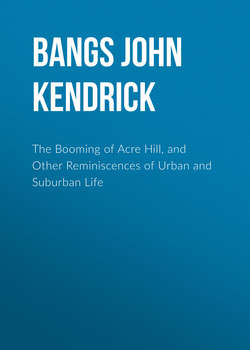Читать книгу The Booming of Acre Hill, and Other Reminiscences of Urban and Suburban Life - Bangs John Kendrick - Страница 7
THE PLOT THAT FAILED
II
Оглавление"YONKERS, N.Y.
"Our Uncle Willie in New York sends us Nursery Days every week. We like it immensely, and every one tries to get the first reading of it. "Tommy and the Huckleberry-tree" is a splendid story. Papa bought six copies of Nursery Days with that in it to send to my little cousins in England.
"JIMMIE CONWAY RHODES."
Others were more laudatory of Partington's story, some less so, but each demanded more of his work.
These written, Partington made arrangements to have them posted from the various towns wherein they were ostensibly written, and then, when they had been posted, he chuckled slightly and sat down to await developments.
It took a trifle over one week for developments to develop, and then they developed rapidly. Just eight days after his conception of this magnificent scheme the postman whistled at Partington's door and left this note:
OFFICE OF NURSERY DAYS,
NEW YORK, March 16, 1889.
"Richard Partington Smithers, Esq.:
"DEAR SIR,—Can you call upon me some afternoon this week? Yours truly,
THOMAS JACKSON TORPYHUE,
"Editor Nursery Days."
"The bait is good, and I'll land the fish at once," said Partington, his face wreathing with smiles. "I'll call upon Mr. Thomas Jackson Torpyhue."
And call he did. Two hours later he entered the sanctum of the editor of Nursery Days.
"Good-afternoon," he said, as he sat down at the editor's side.
"Good-afternoon, Mr. Smithers," said Mr. Torpyhue. "I'm very glad to see you."
"I thought you'd be," began Partington, forgetting himself for a moment in his triumph. "If that wasn't evidence enough that I—ah– oh—er—ah! Ahem! Why, certainly," he continued, suddenly recalling the fact that as yet he could properly have no knowledge of the evidence in question.
The editor threw his head back and laughed, and Partington forced himself to join him, nervously withal.
"You have heard of the evidence have you?" asked Mr. Torpyhue.
Partington gasped faintly, and said he thought not.
"Well, it's very strange, Mr. Smithers," said Mr. Torpyhue, "but do you know that you have developed into one of our most popular authors?"
"Indeed?" queried Partington, pulling himself together and trying to appear gratified.
"Yes, sir. Here is a bundle of twenty-four letters all received within three days. One of the letters calls you the best writer of short stories of the day. Another, from Canada, written by a parent, says that you have written one of the most delightful bits of juvenile humor that he has seen in forty years."
"How extremely flattering!" said Partington, faintly.
"Yes, extremely," assented the editor, dryly. "And now, Mr. Smithers, I'm going to do for you what this paper has never done even to its most popular author in the past."
"Now, my dear Mr. Torpyhue," began Partington, gaining courage, "I beg you not to feel called upon to discriminate against your old favorites in my favor. Your present rates of payment are entirely satisfac—"
"You misunderstand me, Mr. Smithers," interrupted Mr. Torpyhue. "What I'm going to do to you that I never before have done even to our most popular author is to return to you at once every one of those highly entertaining manuscripts you have favored us with—we receive so many real letters from real children that, of course, we cannot afford to buy from you purely fictitious ones. These of yours are excellently well done, but you see my point. One does not pay for things that can be had gratis. Perhaps later you will try us with something else," he added, with a grin.
Here Mr. Torpyhue paused, and Partington tried to think of something to say. It was all so sudden, however, and, in spite of his misgivings, so extremely unexpected, that his breath was taken away. He had neither breath nor presence of mind enough left even to deny the allegation, and when he did recover his breath he found himself walking dejectedly down the stairs of the Nursery Days building with his bundle of encomia in his hands.
"I wonder how he caught on!" he groaned, as half an hour later he entered his room and threw himself face downward on his couch.
Investigation after dinner gave him a clue.
Not one of the letters had been mailed from the town in which it had been dated. The envelope containing the Washington letter bore the Boston postmark. The Brooklyn missive had been sent from Chicago, that from Norwich had been posted at Yonkers, and vice versa, and so on through the whole list. Each and every one had, through some evil chance, started wrong. In addition to this, Partington found that in a forgetful moment he had appended to two of the communications an editorial response promising more work from Mr. Smithers.
"I must have been muddled by my success with 'Tommy and the Huckleberry-tree,'" he sighed, as he cast the documents into the fire. "If that's the effect literary honors have on me I'd better quit the profession, which leaves only two things to be done. I shall have to commit one of two crimes—suicide or matrimony. The question now is, which?"
He thought deeply for a moment, and then, putting on his hat and overcoat, he turned off the gas and left the room.
"I'll call on Harris, borrow a cent from him, and let the toss decide," he said, as he passed out into the night.
Is it really any wonder that Mr. Smithers has given up literature?
